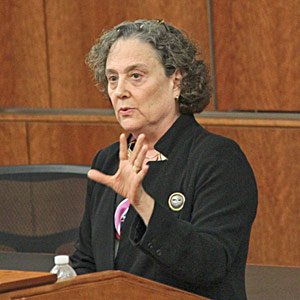Susan Frelich Appleton Delivers Bodenheimer Lecture
 Susan Frelich Appleton, the Lemma Barkeloo & Phoebe Couzins Professor of Law and Israel Treiman Faculty Fellow at Washington University School of Law, delivered the 2013 Brigitte Bodenheimer Lecture on Family Law in the Kalmanovitz Courtroom on March 11. In a lecture entitled "Leaving Home? Domicile, Family, and Gender," Professor Appleton explored the legal concept of domicile and how it may need to evolve in response to changes in the nature of family relationships.
Susan Frelich Appleton, the Lemma Barkeloo & Phoebe Couzins Professor of Law and Israel Treiman Faculty Fellow at Washington University School of Law, delivered the 2013 Brigitte Bodenheimer Lecture on Family Law in the Kalmanovitz Courtroom on March 11. In a lecture entitled "Leaving Home? Domicile, Family, and Gender," Professor Appleton explored the legal concept of domicile and how it may need to evolve in response to changes in the nature of family relationships.
Appleton is a widely respected family law scholar whose research, scholarship, and writings address such legal issues as adoption, assisted reproduction, gender and parentage, surrogacy, and abortion rights. She has co-authored a family law casebook, now in its fourth edition, as well as a casebook on adoption and assisted reproduction, and she has published extensively on family law matters in law reviews and academic journals. A member of the American Law Institute (ALI), she holds the office of Secretary and serves on the ALI Council. She also sits on the Board of Directors of the American Bar Foundation.
Following an introduction by Professor Courtney Joslin, Appleton showed a series of slides depicting the many ways in which traditional concepts of the family are changing, such as same-sex marriage, surrogate parenting, and "LAT" couples who "live apart together." She pointed out that the legal concept of domicile--usually defined as the place where a person has a permanent home or to which he or she intends to return--plays an important role in the application of marriage, estate, child custody, and other areas of family law, but has remained relatively unchanged despite changing family relationships.
Appleton said that the rise of "trans-household families" who do not reside together and the increasingly blurred distinction between home life and work suggest the need for changes in the way domicile is applied in family law. In the same way that corporations may be offered a choice between the place of incorporation, the location of offices, and the places where business is done in deciding jurisdiction for legal matters, it may become necessary for families to be able to choose between the places where a marriage occurred, where work is done, and where family members live, Appleton said. She also hailed the lecture series' namesake, UC Davis Professor Brigitte M. Bodenheimer, for her work supporting the Uniform Child Custody Jurisdiction Act, which offered a framework for resolving conflict of law issues in child custody cases, thus providing an example of a way in which conflicts between jurisdictions could be resolved.
Established in 1981, the Brigitte M. Bodenheimer Lecture on Family Law honors the memory of the late Brigitte Bodenheimer, a distinguished King Hall professor and outstanding family law scholar, by bringing to UC Davis School of Law outstanding scholars and practitioners to discuss the latest developments in family law.
